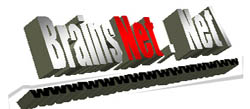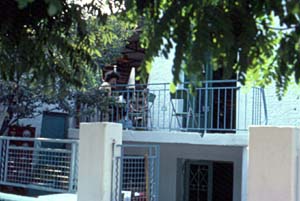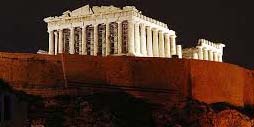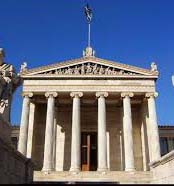
 I
spent my early childhood in Athens on the bank of the river Ilissos and,
as children, we would kick a ball about on the dusty riverbank / stroke
unmade road outside, when suddenly, in the early evening, we would pause
the football for a brief moment to look up at the Parthenon, now all lit
up, and we would say, "It's for the tourists." It was in fact
the regular show Sound and Light, and we could see it happening
from there, in the distance, up on the Acropolis hill, before resuming
our more important kickabout, while mocking the tourists for "coming
here to look at old stones." As children, we never paid any more
attention to all that, except perhaps feeling that we could not afford
to go there and watch the show ourselves - it was "for the tourists."
I
spent my early childhood in Athens on the bank of the river Ilissos and,
as children, we would kick a ball about on the dusty riverbank / stroke
unmade road outside, when suddenly, in the early evening, we would pause
the football for a brief moment to look up at the Parthenon, now all lit
up, and we would say, "It's for the tourists." It was in fact
the regular show Sound and Light, and we could see it happening
from there, in the distance, up on the Acropolis hill, before resuming
our more important kickabout, while mocking the tourists for "coming
here to look at old stones." As children, we never paid any more
attention to all that, except perhaps feeling that we could not afford
to go there and watch the show ourselves - it was "for the tourists."
 This
was a few years after the end of the Nazi occupation of Athens and the
civil war afterwards that had left almost everyone impoverished, or even
penniless and hungry. Later, when I started school, I would hear a little
bit more about the Parthenon and its significance, about democracy and
Pericles and all that stuff, still thinking it was ancient history and
not much relevant to me, let alone relevant to the whole world.
This
was a few years after the end of the Nazi occupation of Athens and the
civil war afterwards that had left almost everyone impoverished, or even
penniless and hungry. Later, when I started school, I would hear a little
bit more about the Parthenon and its significance, about democracy and
Pericles and all that stuff, still thinking it was ancient history and
not much relevant to me, let alone relevant to the whole world.
I have lived most of my adult life in London now, and I know so much more about ancient Greece, and I think differently, but words like democracy still feel like that to me, as part of the dust rising from our football game, the riverbank, and like the arguments I heard at home, about whether to buy a new mattress, for example.
The bank of the river Ilissos running outside our house was where Socrates and Plato used to teach, so the word philosophy feels like that to me also, part of my home furniture, kind of, not a lofty academic subject studied at universities.
During the Golden Era of Athens in the 5th century BC, the Parthenon we could see from my house was built under Pericles. But Pericles was also the name of two of my uncles, the first my mother's older brother who I grew up with in a tiny flat below us, and the second my father's youngest brother who died in his childhood and I never saw. Pericles is not a common name among modern Greeks, this was just a coincidence, but it reinforced the same feeling, that all of that nomenclature and those concepts were nothing lofty, just like the sky above and our home arguments again, the natural order of things.
Older and wiser now, I often despair at what I see happening in the name of democracy around the world, even more so in the name of philosophy. Watching the news on television, I often hear expressions, especially from politicians or activists supporting a partisan viewpoint, like "This is not democratic…" or "Democracy means…" Whether right or wrong, such expressions sound odd to my ears, as if they were talking about my old home, something they know nothing about. Today, such words have become mere labels, which everyone, from hecklers to brutal dictators, wants to attach to their wares for sale to the general public who, for the most part, cannot really judge, except perhaps according to their feelings towards the particular speaker or their political affiliation. It feels a bit like fake goods with prestigious brand names stuck on them, worthless, for cheap mass consumption. Not what the ancient Athenians meant by democracy, which was a method for making practical decisions directly by the majority of its citizenship about the common good, not about dogma or truth - that was the job of philosophy, the science of thinking.
More recently, when I rummaged around the back streets of Tokyo with
Google Street View one day, I chanced, hidden away in a tiny back
alley, upon a tiny 'Academy' spelled as it is here, as well as in Japanese
and, again, for a split-second it felt weird. This was the other side
of the world, the most remote and most distant place on earth from my
childhood house, and a remote part of Tokyo as well, so what was that
word doing here?  Academy
to me was the school founded by my fellow-Athenian Plato, and the bus-stop
for the city-centre shops, which happened to be near the Academy in Athens.
I had to do a double-take, so to speak, mentally, as to where I was with
Street View. How did my bus-stop reach such fame at the other end
of the world? I had seen many Academies in London and elsewhere in the
Western world, but here too, in the tiny back alleyways of oriental Japan?
Is there no place on earth that ancient Greek tribe has not reached?
Academy
to me was the school founded by my fellow-Athenian Plato, and the bus-stop
for the city-centre shops, which happened to be near the Academy in Athens.
I had to do a double-take, so to speak, mentally, as to where I was with
Street View. How did my bus-stop reach such fame at the other end
of the world? I had seen many Academies in London and elsewhere in the
Western world, but here too, in the tiny back alleyways of oriental Japan?
Is there no place on earth that ancient Greek tribe has not reached?
And I wanted to share all this with BrainsNet.Net readers, as an example of how easily we all become habituated with certain words or concepts so as to lose their true meaning, or how others appropriate words to serve their own purposes. Please, see also The Brain and Consciousness, for more on this.
Editor

